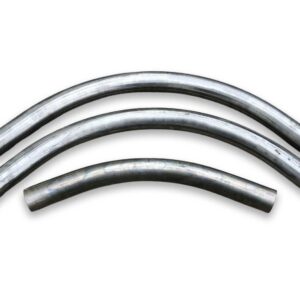Bends are a critical component to the success of any pneumatic conveying system. The right elbow can increase the efficiency and longevity of a system, while a mismatch can lead to blowouts and product contamination. Not limited to a single material, bends are typically made from metals such as aluminum, carbon steel, or stainless steel. Each has useful properties that make them suitable for one application but a poor choice for another.
What are Aluminum Bends?
Aluminum is a soft, lightweight, and corrosion-resistant material ideal for applications that require a high degree of cleanliness, such as in the food and pharmaceutical industries. Aluminum’s malleability allows it to be bent to a tighter radius than other materials, such as carbon and stainless steel, making it a solid choice for systems that require a tight radius bend. Aluminum bends are also quicker and easier to fit and modify than carbon steel, and its light weight allows it to be fastened easily with compression couplings.
Aluminum’s malleability can also be a limitation. Due to its softer nature, aluminum works best for non-abrasive products. As well, while aluminum bends are an excellent choice for low-pressure applications and air-only conveying lines, they may not be suitable for high-pressure systems. Its poor durability also means that care should be taken to protect aluminum bends during shipping, as they can be crushed or bent more easily.
What are Carbon Steel Bends?
When trying to understand what carbon steel is used for, it helps to compare it to other materials, such as aluminum. By doing so, we can see that carbon steel’s high carbon content gives it superior strength, density, durability, and more abrasion resistance than aluminum. Carbon steel can also be thinner than aluminum while maintaining the same structural integrity level. These traits make it attractive to businesses that require the ability to handle heavy loads and stresses, such as the manufacturing or construction industries.
For pneumatic conveying bends, carbon steel has proven to be versatile, cost-effective, and suitable for high-pressure applications. Carbon steel bends are able to withstand harsh environments, abrasive materials, and even high temperatures, making them an excellent choice for conveying systems that require strength and durability. One limitation to keep in mind is that, when comparing carbon steel vs aluminum, carbon steel is prone to rusting and requires a paint coating to protect it from environmental conditions such as salt and moisture. It is also easy to remove particulates that get in the system as you can use magnets to pull the carbon out of the product being conveyed.
What are Stainless Steel Bends?
Stainless steel is a popular material in pneumatic conveying because of its exceptional resistance to corrosion, rust, and staining. It is an ideal choice for systems that require durability and the ability to withstand abrasive materials and other adverse conditions. Additionally, stainless steel is easy to clean and sanitize, making it an appealing choice for industries such as food processing and pharmaceuticals.
Compared to carbon steel, stainless steel bends are more expensive due to the increased time and labor it takes to form, weld, and machine. However, stainless steel bends offer superior resistance to corrosion along with a longer lifespan, making them a cost-effective choice for high-pressure systems that require minimal maintenance.
Choosing the right bend material is critical for the success of your pneumatic conveying system. By understanding the differences between aluminum, carbon steel, and stainless steel, you can choose the right bend material for your application.
At PneuComponents, our mission is to help you find the right parts for your pneumatic conveying system and offer you best-in-class guidance, quality, and service. Contact us today with your questions and we’ll be happy to help you find a solution that doesn’t just work, but works for your unique situation.
As a part of Progressive Products, Inc, PneuComponents draws on over 40 years of technical expertise and industry innovation to give you the best possible guidance and service. Progressive Products is an industry-leading manufacturer of abrasion-resistant components, and their products are used in pneumatic conveying systems worldwide.
-
Stainless Steel Bends$54.42 – $376.47
-
Carbon Steel Bends$22.83 – $198.45
-
Aluminum Bends$16.57 – $124.62



